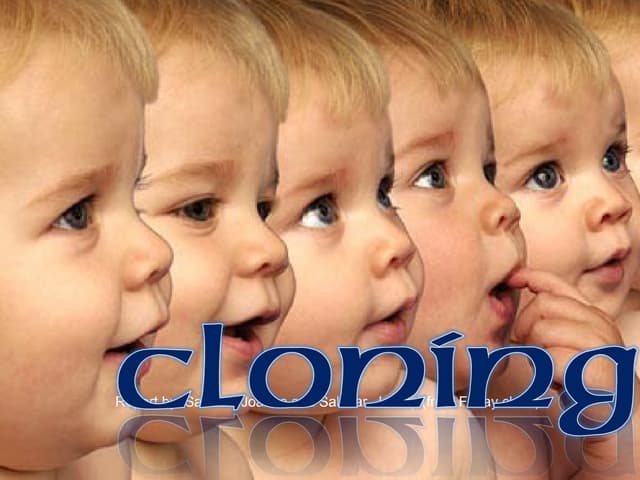

Why human cloning is ethically wrong.
Human cloning is an ethically contentious issue due to various concerns related to individuality, human rights, and the potential for exploitation. The following points outline why human cloning is widely considered ethically wrong:
1. Violation of Individuality: Cloning undermines the uniqueness and individuality that is intrinsic to human beings. Each person is a distinct combination of genetic material from their parents, resulting in a unique set of traits, abilities, and experiences. Cloning would eliminate this natural diversity, leading to a world where individuals are essentially duplicates of one another. This could have profound psychological and social consequences, as personal identity and self-worth are closely tied to individuality.
2. Dignity and Autonomy: Human cloning raises concerns regarding the dignity and autonomy of cloned individuals. Cloning involves creating a human being with the intention of replicating another person, which may lead to the cloned individual being treated as a mere copy or commodity. This undermines their inherent dignity and autonomy, as they may face societal pressures to conform to the expectations or desires of the person they were cloned from.
3. Health Risks and Genetic Abnormalities: The cloning process itself poses significant health risks. Animal cloning experiments have shown high rates of failure, with cloned animals often experiencing severe health issues and shortened lifespans. These risks are even more concerning when applied to human cloning, as any genetic abnormalities or health problems that arise would directly impact the cloned individual's quality of life.
4. Exploitation and Reproductive Rights: Human cloning raises concerns about the potential for exploitation and violation of reproductive rights. Cloning could be used as a means of reproductive control, where individuals or societies dictate who can reproduce and create clones, thereby infringing upon the reproductive autonomy and freedom of choice of individuals.
5. Social and Economic Inequality: Cloning could exacerbate existing social and economic inequalities. The technology required for cloning would likely be expensive and accessible only to a privileged few, leading to a scenario where cloned individuals predominantly belong to a specific socioeconomic class. This could perpetuate existing inequalities and create a divide between the cloned elite and non-cloned majority.
6. Unresolved Ethical Questions: There are several unresolved ethical questions surrounding human cloning, such as the status and rights of cloned individuals, their relationship with the person they were cloned from, and the implications for familial and societal structures. The lack of consensus on these issues highlights the need for caution and further ethical deliberation before proceeding with human cloning.
While there are ongoing debates on the topic, many countries and international organizations have imposed bans or restrictions on human cloning due to these ethical concerns. It is essential to carefully consider the potential consequences and ethical implications before pursuing such a controversial and ethically complex technology.
Note: This response is based on general ethical arguments against human cloning. The specific ethical perspectives may vary depending on cultural, religious, and philosophical beliefs.
Related Posts
© 2025 Invastor. All Rights Reserved

User Comments
James Dean
a year ago
I'm not sure what you're trying to say, but I see how religious people would be upset if they believed scientists were playing god. I don't think that makes it immoral from my perspective, though.
Myrtle Johnson
a year ago
First shot at this, so... People who believe in god thing it's his job to make people, not anybody else's job. Is that hos shit woks around here or no?
Frances Hedrick
a year ago
I agree, so long as we don't expect too much of them. Pressure like that sucks.
Theodore Welch
a year ago
Religious people view it as wrong (playing god) and ofcourse the problem that cloning isn't a very well understood or perfect process and the subjects are more likely then not going to have horrible side effects. If we'd work the kinks out tho, I'd definitely go for cloning some Einsteins etc. (We'd probably get our hands on some of his DNA somehow). It could really benefit the society tremendously.
Loretta Rodriguez
a year ago
there are seveal concepts a) if you clone a number of the same person they could all be prone to a certain disease b) if you can choose your child's gene makup then this would lead to gene racism I believe the stigma comes from using placenta stem cells , which is frowned apon. There would also be an aspect of religion in america with a high % of christian people thinking playing god is a sin.
Emily Martinez
a year ago
Clones could be part of the slave economy, but I would have a rule that all clones of slaves are forever free.
Devon Croteau
a year ago
I see how it could be hard to be a clone, knowing that you aren't normal is never easy.
Ronald Markland
a year ago
We're far off from that technology to perfectly clone a human being. And I imagine there could be some identity issues with the 'clones.' What if your parents just told you that all you are is a copy of their first son that died. Or something along the lines. Just my opinion..
Giuseppe Davis
a year ago
I hate to be the only Christian in here, but it is because the vast majority of people beleive in God or gods; and they beleive that the clones will not have souls.
Christoper Salazar
a year ago
"As long as people don't use clones..." I think that's the problem. There's still a slave trade going on, children are used as soldiers and prostitutes, and people everywhere are still being exploited even without cloning. Imagine what cloning would do for the slave trade. Adult humans, fully formed, with no one looking for them? Cloning totally would be used to raise an army.